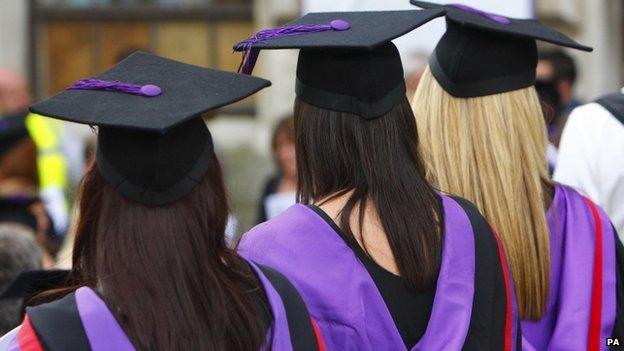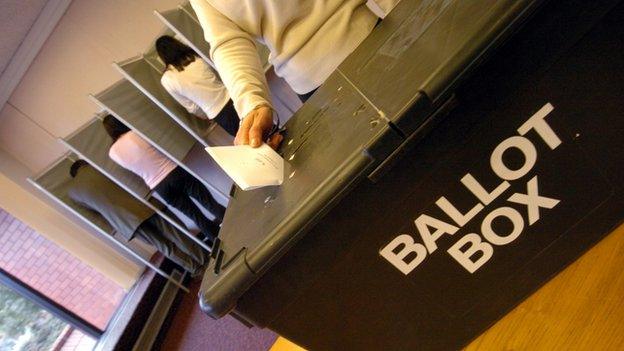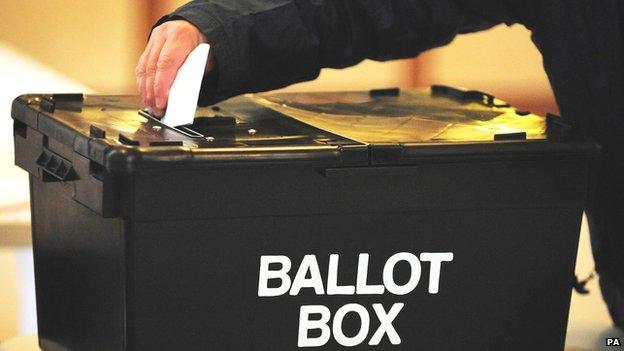Thousands of student voters yet to register
- Published

Student areas seem to have seen a much more dramatic drop-off in voter numbers than elsewhere
Thousands of students have failed to register to vote for the next general election, research for the Sunday Politics suggests.
They have been caught out by a quirk of the old electoral registration system, which ended this summer, under which the responsibility for registering voters lay with the rather old-fashioned idea of the "head of the household".
Under plans brought in by the Labour government and accelerated by the coalition, the system has been changed to individual voter registration.
Now individual voters have to register themselves.
Although 87% of existing voters have been automatically transferred, 13% have not and it appears that it is students who have been left out.
Significant fall
Before this October, first-year students tended to be registered en masse by their college or university acting as "head of the household", which ensured almost 100% registration.
This year, that was no longer allowed and student registration has fallen significantly.
Although non-student areas also saw a drop in the number of registered voters, the change in student towns was much higher.
The BBC looked at figures from nine areas where the student population is low - North Norfolk, Tamworth, Tewkesbury, Derbyshire Dales, Barrow-in-Furness, Weymouth and Portland, Boston and Richmondshire.
In those areas, the total number of registered voters, which was 457,099 in 2012 dropped by 4,139 in 2013 and dropped by nearly three times as much, 11,394 ,between 2013 and 2014.
But in 21 areas with large student populations, the change is more dramatic.
The BBC looked at voter registration figures from Manchester, Birmingham, Newcastle upon Tyne, Cardiff, Leicester, Oxford, Southampton, Coventry, Cambridge, Portsmouth, Plymouth, Canterbury, Swansea, Bath and North East Somerset, Bradford, Bournemouth, Exeter, Kirklees, Lancaster, Norwich and Derby.
In total, registered voters, who numbered nearly 4.49m in 2012, dropped by 9,727 in 2013 and by a massive 181,552 in 2014 - nineteen times higher than the drop-off the previous year.
'Crisis'
In one of those towns, Oxford, registrations in some wards with large amounts of student residents fell by 60%.
It is not possible to prove every one of these missing voters is a student, but universities, local authorities and student bodies are confident the vast majority are.
Constitution Minister Sam Gyimah says the government is aware of the problem. He told us: "We've invested so far £4.2m to ensure that under-represented groups, of which students are one - you've got black and minority ethnic groups, you've also got other types of voters - are targeted and reached by the local authorities to get them on the register."
The registration process is online, external and takes just minutes to complete so some people ask why, if students want to vote and think it's important, they don't take responsibility and complete the form?
Others however think local authority election registration officers, the Electoral Commission, and universities should be being more proactive in informing students that they need to act.
The "Bite the Ballot, external" campaign to encourage greater youth participation in elections says it thinks such bodies have underestimated the scale of the problem, even describing it as "a crisis"
Nick Hillman of the Higher Education Policy Institute, who has studied the impact of student voting, says if the situation stays as it is, then our democracy will suffer.
"There are 12 seats at the next general election that we estimate could be decided by the student population. With the next election looking like it will be very close, 12 seats could decide who makes up the next government."
The Electoral Commission insists it is dealing with the problem.
"It's important that those people not currently registered to vote are targeted to ensure the registers are as accurate and complete as possible.
"To support the local activity that is happening, we are running a national, mass media public awareness campaign from 16 March and are already working with a range of partners to help get people, including students, registered before the 20 April deadline"
Some student groups are concerned, though, that mid-March 2015 is a little late to catch the thousands of students who, right now, are not only not registered to vote at university in an election that will happen during term time, but who still seem unaware they even need to register.
- Published21 October 2014

- Published10 June 2014
